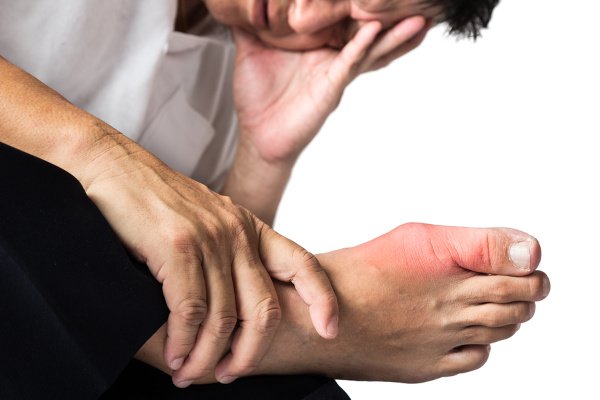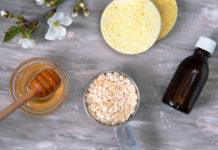
If you’ve ever suffered a gout attack, you know how completely terrible they can be. From burning and swelling, to excruciating pain, gout is one of the most unpleasant conditions there is. Once you feel the warning signs of a gout attack coming on, you know you want to do whatever you can to mitigate the pain. If you deal with gout pain and discomfort, here are 4 gout remedies to help you through it.
What is Gout?
Gout is a form of inflammatory arthritis that is caused by a buildup of uric acid in the blood. It’s a common type of arthritis, but leads to intense pain, swelling and stiffness in a joint. It often affects the joint in the big toe, but can also occur in other joints in the body such as the ankles, knees, elbows, wrists and fingers. Gout attacks can occur without warning in the middle of the night, and an attack typically begins with a burning, itching or tingling feeling in the joint an hour or two before the flare-up starts.
What Are the Symptoms of Gout?
Gout flare-ups are extremely unpleasant. The main symptoms are intense and even excruciating joint pain that eventually subsides to discomfort, inflammation and redness. Here are some common symptoms of gout to look out for.
1. Pain in Your Big Toe
Pain in the big toe is the most common symptom of gout. Excess uric acid accumulates in the joint of the big toe, resulting in a very sore toe and the inability to walk. The pain can be so bad that it causes you to limp until it fades after a few hours or days.
2. Tenderness, Swelling and Redness
These three things are all signs and symptoms of gout. After the initial pain of a gout attack has subsided, you will likely experience all these things at one point or another. You may notice them directly on the joint, or in the surrounding areas and even across the body. If you have gout in your big toe, you may notice your entire foot and leg affected by these symptoms.
3. Pain Attacks (Especially at Night)
People with gout experience sudden pain attacks, most often in the toes, feet, legs and lower extremities. These attacks can reverberate throughout your body and make it hard for you to walk or stand. These pain attacks often happen in the middle of the night, making it difficult for you to get back to sleep.
What Causes Gout?
Gout is caused by an excess of uric acid in the bloodstream. Uric acid is produced in the body during the breakdown of purines, which are chemical compounds found in high amounts in certain foods like fish, poultry and meat. Uric acid is normally dissolved in the blood and passed through your body via urine. If there’s too much uric acid in the blood, it builds up and forms needle-like crystals that cause inflammation and pain in the joints.
People can be susceptible to gout for numerous reasons. Genetics plays a part. If you have a family history of gout, you have a higher likelihood of developing it yourself. Alcohol interferes with the process of uric acid leaving your body, as does eating a high-purine diet. Certain medications can also increase the amount of uric acid in the body, including diuretics and drugs containing salicylate. Being overweight can also increase your risk of gout, since there’s more turnover of body tissue, which means more production of uric acid.
How to Prevent Gout
1. Watch What You Eat
The triggers of gout are mainly diet related, as certain foods can raise uric acid in your blood even more. Stay away from foods that are high in purines, such as seafood, organ meats like liver, and fatty foods.
2. Cut Out Alcohol and Other Sweet Drinks
Fructose-sweetened drinks and alcohol can also lead to more pain. Alcohol, especially beer, and especially in excess, can lead to a gout flare up.
3. Be Cautious of Weight Gain
Since being heavier can make you more susceptible to gout, watching your weight gain is one way to prevent it. Eating a healthy diet low in purines and sweetened drinks can lower your uric acid and reduce your risk of gout attacks. Leading an active lifestyle and regular exercise will help you stay in shape and keep your weight in check.
4 Gout Remedies for Pain
1. Drink More Water
The more water you drink, the more level you’re able to keep the uric acid levels in your body. When you don’t drink enough water, the uric acid levels rise and cause more pain. Drink water throughout the day to keep the levels normalized and to reduce pain.
2. Apply a Cold Compress
Applying a cold compress to the affected area can help ease pain and inflammation. Apply the cold compress to the area for 20-30 minutes several times a day- you can make one using a bag of crushed ice or a pack of peas and a dish cloth.
3. Rest and Relax
If you’ve had a gout attack, one of the best things you can do is rest your body. Stress can aggravate gout, so relax as much as you can- watch Netflix, call a friend, read a book or listen to music to get you into a relaxed state. Whatever you do, don’t go on any long walks or stand for a long time- this will make the pain much worse.
4. Medication
If you feel the symptoms of a gout attack coming on, use what you have on hand right away. Over-the-counter ibuprofen (Motrin and Advil) or naproxen (Aleve) will help relieve the pain, but never take Aspirin, which can actually make your symptoms worse. If you’ve been prescribed an anti-inflammatory by your doctor for your gout flare-ups, make sure to take the recommended dose. If you have frequent pain and flare-ups, you may be prescribed a daily medication of a uric acid lowering drug.
If you’ve been dealing with gout, we hope these prevention tips and remedies help ease the pain and discomfort!
















